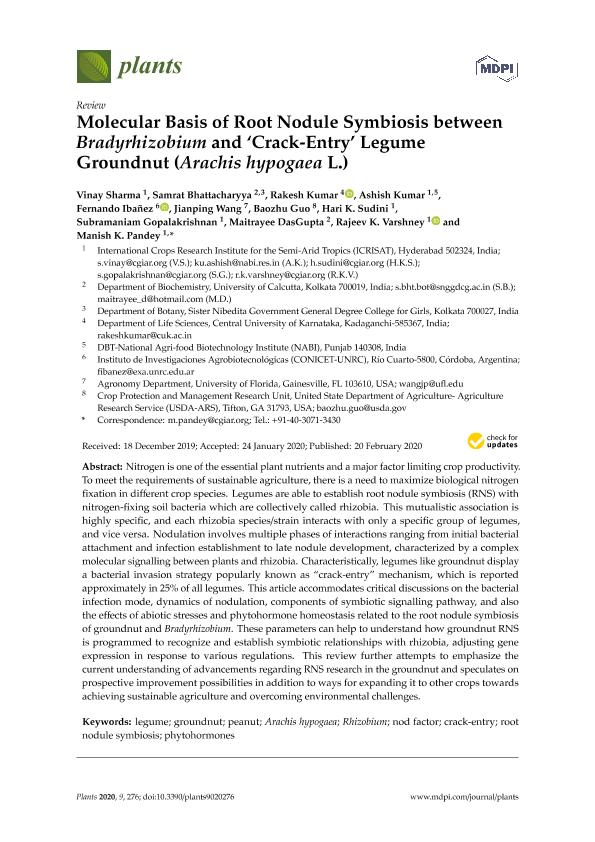Mostrar el registro sencillo del ítem
dc.contributor.author
Sharma, Vinay
dc.contributor.author
Bhattacharyya, Samrat
dc.contributor.author
Kumar, Rakesh
dc.contributor.author
Kumar, Ashish
dc.contributor.author
Ibañez, Fernando Julio

dc.contributor.author
Wang, Jianping
dc.contributor.author
Guo, Baozhu
dc.contributor.author
Sudini, Hari K.
dc.contributor.author
Gopalakrishnan, Subramaniam
dc.contributor.author
Dasgupta, Maitrayee
dc.contributor.author
Varshney, Rajeev K.
dc.contributor.author
Pandey, Manish K.
dc.date.available
2021-10-03T21:47:15Z
dc.date.issued
2020-02
dc.identifier.citation
Sharma, Vinay; Bhattacharyya, Samrat; Kumar, Rakesh; Kumar, Ashish; Ibañez, Fernando Julio; et al.; Molecular basis of root nodule symbiosis between bradyrhizobium and ‘crack-entry’ legume groundnut (Arachis hypogaea l.); MDPI; Plants; 9; 2; 2-2020; 1-24
dc.identifier.uri
http://hdl.handle.net/11336/142389
dc.description.abstract
Nitrogen is one of the essential plant nutrients and a major factor limiting crop productivity. To meet the requirements of sustainable agriculture, there is a need to maximize biological nitrogen fixation in different crop species. Legumes are able to establish root nodule symbiosis (RNS) with nitrogen-fixing soil bacteria which are collectively called rhizobia. This mutualistic association is highly specific, and each rhizobia species/strain interacts with only a specific group of legumes, and vice versa. Nodulation involves multiple phases of interactions ranging from initial bacterial attachment and infection establishment to late nodule development, characterized by a complex molecular signalling between plants and rhizobia. Characteristically, legumes like groundnut display a bacterial invasion strategy popularly known as “crack-entry’’ mechanism, which is reported approximately in 25% of all legumes. This article accommodates critical discussions on the bacterial infection mode, dynamics of nodulation, components of symbiotic signalling pathway, and also the effects of abiotic stresses and phytohormone homeostasis related to the root nodule symbiosis of groundnut and Bradyrhizobium. These parameters can help to understand how groundnut RNS is programmed to recognize and establish symbiotic relationships with rhizobia, adjusting gene expression in response to various regulations. This review further attempts to emphasize the current understanding of advancements regarding RNS research in the groundnut and speculates on prospective improvement possibilities in addition to ways for expanding it to other crops towards achieving sustainable agriculture and overcoming environmental challenges.
dc.format
application/pdf
dc.language.iso
eng
dc.publisher
MDPI
dc.rights
info:eu-repo/semantics/openAccess
dc.rights.uri
https://creativecommons.org/licenses/by/2.5/ar/
dc.subject
ARACHIS HYPOGAEA
dc.subject
CRACK-ENTRY
dc.subject
GROUNDNUT
dc.subject
LEGUME
dc.subject
NOD FACTOR
dc.subject
PEANUT
dc.subject
PHYTOHORMONES
dc.subject
RHIZOBIUM
dc.subject
ROOT NODULE SYMBIOSIS
dc.subject.classification
Biotecnología Agrícola y Biotecnología Alimentaria

dc.subject.classification
Biotecnología Agropecuaria

dc.subject.classification
CIENCIAS AGRÍCOLAS

dc.title
Molecular basis of root nodule symbiosis between bradyrhizobium and ‘crack-entry’ legume groundnut (Arachis hypogaea l.)
dc.type
info:eu-repo/semantics/article
dc.type
info:ar-repo/semantics/artículo
dc.type
info:eu-repo/semantics/publishedVersion
dc.date.updated
2021-09-06T16:10:35Z
dc.identifier.eissn
2223-7747
dc.journal.volume
9
dc.journal.number
2
dc.journal.pagination
1-24
dc.journal.pais
Suiza

dc.journal.ciudad
Basilea
dc.description.fil
Fil: Sharma, Vinay. International Crops Research Institute For The Semi-arid Tropics; India
dc.description.fil
Fil: Bhattacharyya, Samrat. Sister Nibedita Government General Degree College For Girls; India. University Of Calcutta; India
dc.description.fil
Fil: Kumar, Rakesh. Central University Of Karnataka; India
dc.description.fil
Fil: Kumar, Ashish. National Agri-food Biotechnology Institute; India. International Crops Research Institute For The Semi-arid Tropics; India
dc.description.fil
Fil: Ibañez, Fernando Julio. Universidad Nacional de Rio Cuarto. Facultad de Ciencias Exactas Fisicoquímicas y Naturales. Instituto de Investigaciones Agrobiotecnológicas - Consejo Nacional de Investigaciones Científicas y Técnicas. Centro Científico Tecnológico Conicet - Córdoba. Instituto de Investigaciones Agrobiotecnológicas; Argentina
dc.description.fil
Fil: Wang, Jianping. University of Florida; Estados Unidos
dc.description.fil
Fil: Guo, Baozhu. United States Department of Agriculture. Agriculture Research Service; Estados Unidos
dc.description.fil
Fil: Sudini, Hari K.. International Crops Research Institute For The Semi-arid Tropics; India
dc.description.fil
Fil: Gopalakrishnan, Subramaniam. International Crops Research Institute For The Semi-arid Tropics; India
dc.description.fil
Fil: Dasgupta, Maitrayee. University Of Calcutta; India
dc.description.fil
Fil: Varshney, Rajeev K.. International Crops Research Institute For The Semi-arid Tropics; India
dc.description.fil
Fil: Pandey, Manish K.. International Crops Research Institute For The Semi-arid Tropics; India
dc.journal.title
Plants
dc.relation.alternativeid
info:eu-repo/semantics/altIdentifier/doi/http://dx.doi.org/10.3390/plants9020276
dc.relation.alternativeid
info:eu-repo/semantics/altIdentifier/url/https://pubmed.ncbi.nlm.nih.gov/32093403/
Archivos asociados
